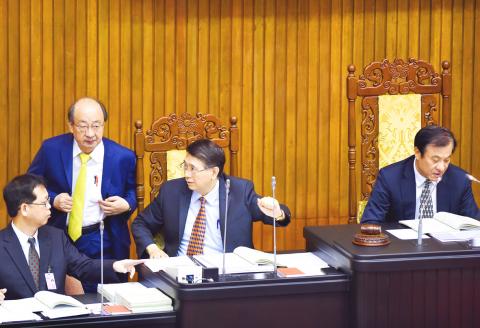The Democratic Progressive Party (DPP) caucus is ready to unveil a draft anti-infiltration law today, caucus whip Ker Chien-ming (柯建銘) said yesterday, adding that the goal is to have the bill clear a second reading on Friday.
Concerns about Beijing’s attempts to annex Taiwan and reports about a self-confessed Chinese spy saying that he had been tasked with influencing elections in Taiwan show that an anti-infiltration law is needed, Ker said.
Following discussions with the Ministry of Justice, Mainland Affairs Council and Executive Yuan, the DPP on Friday devised the core of the bill and would reveal its details at a news conference today, he said.

Photo: Chien Jung-fong, Taipei Times
The bill would be submitted to the legislature’s Procedure Committee for review tomorrow, he added.
On Thursday, the legislature’s Internal Administration Committee is to hold a public hearing on a series of proposed draft amendments to crack down on Chinese proxies promoting Beijing’s interests in Taiwan, Ker said.
The hearing would provide an opportunity to exchange opinions on the anti-infiltration bill before legislators meet on Friday for its second reading, he said.
On whether the bill could clear a third reading before the end of the legislative session, Ker said it depends on “the attitude of opposition parties.”
Chinese Nationalist Party (KMT) caucus whip William Tseng (曾銘宗) said his caucus would determine its stance on the bill after reading the document.
The KMT would consider whether the bill is indeed necessary to ensure national security and stability, he added.
The bill would ban people from lobbying for a political cause, making political donations, interfering with assemblies, undermining social order or engaging in other activities that could influence local elections and referendums based on instructions, or using funds, from a foreign state or organization.
Those found guilty of influencing elections in such manners could be sentenced to up to seven years in prison in addition to a fine of up to NT$5 million (US$163,843), according to the bill.
If an organization is found guilty, the person in charge would be held responsible, it states.
Although a number of laws — including the Political Donations Act (政治獻金法), the Referendum Act (公民投票法), the Lobbying Act (遊說法) and the Civil Servants Election and Recall Act (公職人員選舉罷免法) — already ban such activities, the proposed bill would increase the punishments.
While the New Power Party (NPP) has accused the DPP of deliberately setting aside the bill and related proposed amendments, DPP lawmakers have been working on them since the end of May, Ker said.
On Nov. 16, Ker said that bills to crack down on Chinese Communist Party proxies would not pass a third reading during the current legislative session due to the limited time remaining.
Ker yesterday said there are eight versions of similar bills proposed by the DPP caucus, NPP caucus and a number of DPP legislators.
Incorporating different versions could be difficult and the DPP caucus has been pondering how to best approach the issue, he said.

INVESTIGATION: The case is the latest instance of a DPP figure being implicated in an espionage network accused of allegedly leaking information to Chinese intelligence Democratic Progressive Party (DPP) member Ho Jen-chieh (何仁傑) was detained and held incommunicado yesterday on suspicion of spying for China during his tenure as assistant to then-minister of foreign affairs Joseph Wu (吳釗燮). The Taipei District Prosecutors’ Office said Ho was implicated during its investigation into alleged spying activities by former Presidential Office consultant Wu Shang-yu (吳尚雨). Prosecutors said there is reason to believe Ho breached the National Security Act (國家安全法) by leaking classified Ministry of Foreign Affairs information to Chinese intelligence. Following interrogation, prosecutors petitioned the Taipei District Court to detain Ho, citing concerns over potential collusion or tampering of evidence. The

TRADE: The premier pledged safeguards on ‘Made in Taiwan’ labeling, anti-dumping measures and stricter export controls to strengthen its position in trade talks Products labeled “made in Taiwan” must be genuinely made in Taiwan, Premier Cho Jung-tai (卓榮泰) said yesterday, vowing to enforce strict safeguards against “origin laundering” and initiate anti-dumping investigations to prevent China dumping its products in Taiwan. Cho made the remarks in a discussion session with representatives from industries in Kaohsiung. In response to the US government’s recent announcement of “reciprocal” tariffs on its trading partners, President William Lai (賴清德) and Cho last week began a series of consultations with industry leaders nationwide to gather feedback and address concerns. Taiwanese and US officials held a videoconference on Friday evening to discuss the

NEGOTIATIONS: The US response to the countermeasures and plans Taiwan presented has been positive, including boosting procurement and investment, the president said Taiwan is included in the first group for trade negotiations with the US, President William Lai (賴清德) said yesterday, as he seeks to shield Taiwanese exporters from a 32 percent tariff. In Washington, US Trade Representative Jamieson Greer said in an interview on Fox News on Thursday that he would speak to his Taiwanese and Israeli counterparts yesterday about tariffs after holding a long discussion with the Vietnamese earlier. US President Donald Trump on Wednesday postponed punishing levies on multiple trade partners, including Taiwan, for three months after trillions of US dollars were wiped off global markets. He has maintained a 10 percent

PERSONAL DATA: The implicated KMT members allegedly compiled their petitions by copying names from party lists without the consent of the people concerned Judicial authorities searched six locations yesterday and questioned six people, including one elderly Chinese Nationalist Party (KMT) member and five KMT Youth League associates, about alleged signature forgery and fraud relating to their recall efforts against two Democratic Progressive Party (DPP) legislators. After launching a probe into alleged signature forgery and related fraud in the KMT’s recall effort, prosecutors received a number of complaints, including about one petition that had 1,748 signatures of voters whose family members said they had already passed away, and also voters who said they did not approve the use of their name, Taipei Deputy Chief Prosecutor